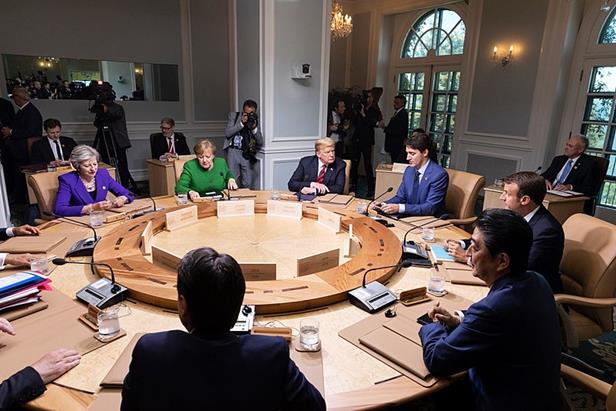In his latest Sputnik Radio interview Srdja Trifkovic discusses British Prime Minister Theresa May’s initiative at the G7 summit in Canada to develop a “rapid and unified” response to alleged hostile actions by Russia. The plan was previously divulged by Foreign Secretary Boris Johnson to a closed door meeting with Conservative MPs. [Audio]
Trifkovic: My first thought is, “Trust the Brits!” In reality the United Kingdom is . . . the most Russophobic country in the world today. I am talking about the entire elite class—the politicians, the media, the analysts, the academia—even more so than in the United States. This has been a constant feature of the upper tier of the British society for decades. What Prime Minister May and Foreign Secretary Johnson are naming as the nature of the threat . . . is exactly the sorts of activities that Western countries, including the United States, have been engaging in—not for years, but for decades: election meddling, regime change operations, illegal aggression, and so on. It is ironic that the pot is calling the kettle black.
Most continental Europeans may be less willing than before to follow this clarion call. In the aftermath of the Skripal case, many of them decided to support the British version of events. Some of them have had second thoughts and it increasingly looks like it was a false flag operation. Following Mrs. May and Mr. Johnson on the same path of escalating the tension with Russia is not in the interest either of Italy—it has a new government which may change course—or, primarily, Germany and France, which have been at the receiving end of the financial cost of sanctions. At the same time, Britain and especially the United States have very little to lose . . . [Theresa May] is taking it for granted that it was indeed a Russian-conducted operation, to murder former colonel Skripal and his daughter. As we now know—since they survived—that whole thing is beginning to look like a set-up, or a false flag operation. Many people who initially supported the British version of events are having second thoughts.
Sputnik: What this rapid response could actually be?
Trifkovic: “Rapid response” doesn’t necessarily mean a military force. It will be a combination of cyber specialists and propaganda experts, forensic IT and financial experts, and so on. There is more smoke than real fire about the whole thing. The rating of Boris Johnson as Britain’s Foreign Secretary is pretty low, his stock is not very high either in Britain or in the international circles, so in the end this will be much ado about nothing.
Sputnik: What are your thoughts on the state of Britain and Brexit, and Prime Minister Theresa May’s status right now in light of the David Davis scandal and his threats to leave?
Trifkovic: In her heart of hearts she would prefer not to go ahead with it if she could. In the run-up to the 2016 referendum she was pretty wishy washy. Boris Johnson was all for leaving the EU, but Theresa May was not; she finds herself in a paradoxical situation of having to see it through, without having a clear picture of what it will mean if Brussels stays firm; if indeed it will be a very hard Brexit. At the same time, her attempts to revive the special relationship with Washington are tepid. Without anchorage in Europe this trans-Atlantic relationship would give Britain an alternative strategic focal point, but there is no real chemistry with Trump.
Sputnik: The Western media, for the most part, have been showing this G7 Summit as “the six against Trump,” . . . On the other hand, we have Trump saying that Russia should be part of the G7—your comment?
Trifkovic: I think indeed Russia should, even though in terms of the actual size of Russia’s economy it has been rather stagnant in global terms. Russia’s share of the world economy has not gone beyond 2% for a great number of years; but first of all misusing the G7, which should be focused on economics, to advance yet another russophobic plan is self-defeating, and I don’t think that May will get very far. As far as the continental Europeans are concerned, with the new government in Italy we have a new ball game. I believe that there will be increased pressures, particularly, from the business community in Germany, not to escalate tensions [with Russia] any further. At the same time we should not underestimate the ability of Europeans to be supine, to submit themselves to the diktat from Washington after all. In view of what we’ve seen since the imposition of the Russian sanctions in 2014, the clout of the United States, the ability of Washington to impose its will on the Europeans, is indeed both surprising and remarkable.



Leave a Reply